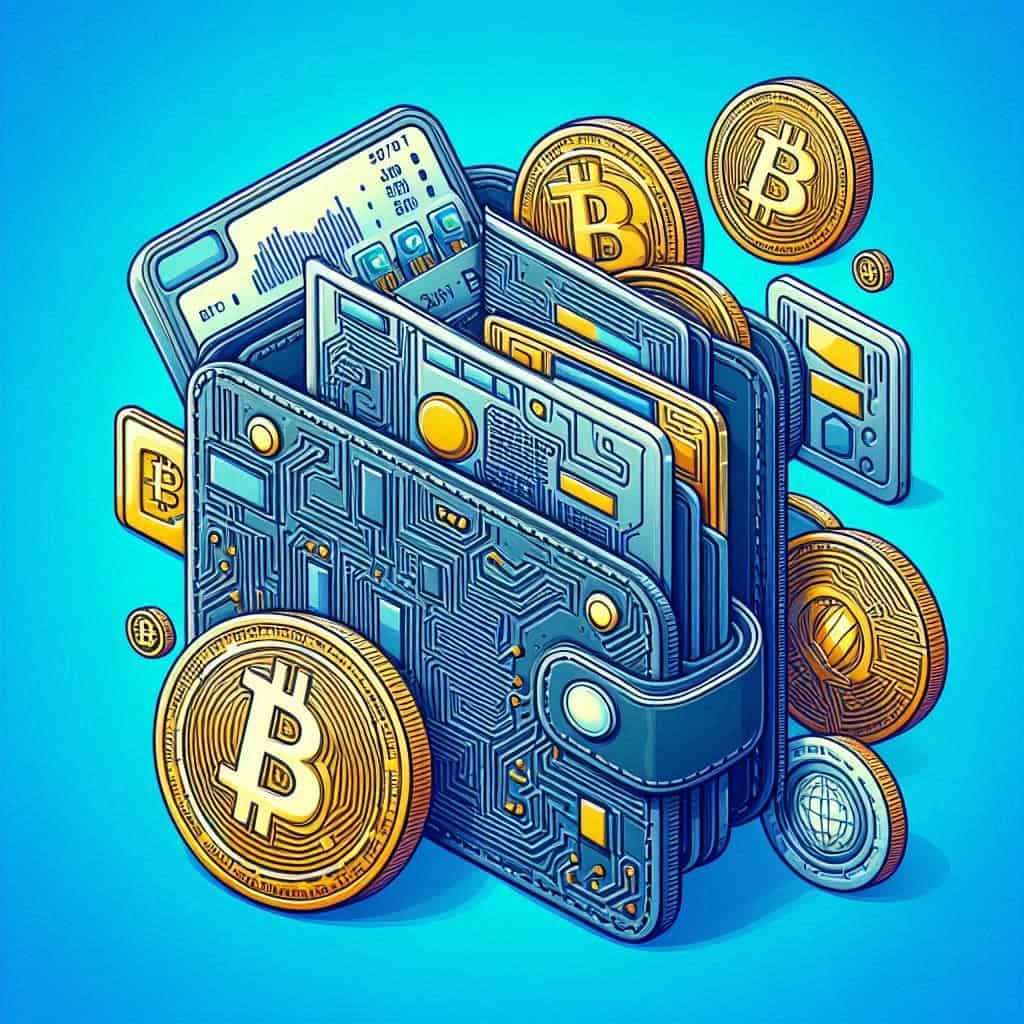Are you a beginner looking to explore the innovative world of decentralized finance? DeFi platforms have garnered significant attention from individuals seeking access to a wide range of decentralized financial products and services.
However, the question remains: how can you access these cutting-edge offerings? The first step is creating a DeFi wallet, and in this article, we will take a deep dive into what DeFi wallets are, their capabilities, and how they differ from traditional cryptocurrency wallets.
If you’re ready to start interacting with DeFi platforms seamlessly and unlock the full potential of this rapidly evolving ecosystem, read on.
What is a DeFi Wallet
A DeFi wallet is a crypto wallet with built-in features that allow users to access decentralized finance (DeFi) platforms. This type of wallet is similar to any other cryptocurrency wallet, providing users with the infrastructure necessary to store, send, and receive digital tokens.

However, what differentiates it from traditional digital wallets is its ability to connect with DeFi platforms, facilitating direct interactions between users and DeFi protocols.
How does a DeFi wallet work and what can you do with it?
One of the distinguishing features of DeFi wallets is that they grant users self-custody of their tokens. Unlike custodial wallets offered by centralized exchanges, where a third party holds users’ private keys, DeFi wallets grant users full control of their funds.
What this means is that users hold the private keys to their wallets and are responsible for securing the funds stored on those wallets.
DeFi wallets serve as access cards, granting users convenient and seamless entry into the decentralized web (popularly known as Web3)
TheDeFiMovement
However, the functionalities of DeFi wallets extend beyond just granting users full control of their assets. With a DeFi wallet, users can;
- access decentralized applications (dApps)
- seamlessly and conveniently trade cryptocurrency tokens on decentralized exchanges
- provide liquidity on DeFi pools
- earn rewards by staking their tokens
- store and manage non-fungible tokens (NFTs)
- access quick, low-interest crypto loans without the need for paperwork, etc.
DeFi wallets serve as access cards, granting users convenient and seamless entry into the decentralized web (popularly known as Web3). These software applications typically include a lightweight web browser, often known as a dApp browser, which enables users to interact with decentralized applications.
When interacting with a decentralized application through a dApp browser, users can easily connect their wallets to whatever protocol they’re interacting with and perform seamless transactions, all within a single app.
This is what makes DeFi wallets the most convenient medium for connecting or interacting with dApps.
What is the difference between a DeFi wallet and a normal crypto wallet?
While DeFi wallets and traditional wallets are similar in their basic functionalities, there are a number of things that differentiate them. We explore these differences in detail below.
| DeFi wallet | Traditional Crypto Wallet |
| Can store and transfer crypto tokens as well as provide users with an interface that integrates seamlessly with decentralized applications | Designed solely for storing and transferring cryptocurrency tokens |
| DeFi wallets are non-custodial wallets, meaning users hold their private keys. | This category of digital wallets is usually found on centralized exchanges, with the administrator having complete control over the wallet including the private keys. |
| Anyone with an internet connection can create and use a DeFi wallet | To comply with regional regulations, wallet providers may restrict access to users in certain locations. |
| Users are responsible for the security of the funds stored in their wallet. | Since users don’t hold their private keys, the wallet provider is responsible for securing user funds and assets from malicious actors. |
| If a user loses their private key (or recovery phrase), they automatically lose access to the funds stored on that wallet…FOREVER! | Wallets in this category are usually managed by a single company or organization. If a user loses (or forgets) their password, they can easily add a new one or seek assistance from a support representative at the company. |
Benefits of DeFi wallets
1. Control and ownership
DeFi wallets provide users with the infrastructure necessary to gain direct access to storage allocation on a blockchain. With a DeFi wallet, any crypto holder can store and manage their assets without giving away partial control to a third party.
2. Enhanced privacy and security
Funds held in a custodial crypto wallet are vulnerable to theft, especially if the company or service responsible for securing users’ private keys falls victim to a hack. Non-custodial wallets like DeFi wallets are less susceptible to such attacks.

This is because they do not store users’ private keys. While non-custodial wallet providers may provide the technology necessary for users to interact with blockchains, they do not store clients’ access keys in their systems.
This makes it significantly harder for malicious actors to steal users’ funds.
3. Seamless connection with DeFi programs
Transacting on DeFi platforms using a regular web browser can be stressful and time-consuming. You’d have to scan a QR code generated on the platform in order to connect your non-custodial wallet to the protocol.
Using a DeFi browser can make this process smoother and less tedious. All users have to do in this case is authorize — either by a password or biometric lock — the platform’s connection to their wallet.
Once authorized, the user will need to sign the connection request with their private keys, linking their wallet to the DeFi protocol.
This doesn’t take longer than 30 seconds and can be completed from within the DeFi wallet app.
Using a DeFi browser can make transacting on DeFi platforms smoother and less tedious.
TheDeFiMovement
Disadvantages of DeFi wallets
1. Complexity
Learning to transact with decentralized finance wallets can be a bit of a steep learning curve for new users. Depending on the type of protocol a beginner decides to interact with, they may need to familiarize themself certain terms or concepts so as to avoid potential financial losses.
2. Independent custody
While the allure of having total control over one’s access keys may seem enticing, independent wallet management comes with its own drawbacks. Custodial wallet services like exchanges invest a significant amount of money into security systems to protect users’ assets.
While they do introduce a central point of vulnerability, custodial wallets can sometimes offer a more user-friendly and potentially more secure environment for those who are new to cryptocurrency or who prioritize convenience over complete control.
It’s not uncommon to find that users misplace their private keys resulting in the irreversible loss of funds. Additionally, DeFi users are susceptible to phishing scams designed to steal private keys and access crypto holdings.
Which DeFi wallet is the best?
Finding the best decentralized finance wallet ultimately depends on the user’s specific requirements and preferences.
It’s important that users prioritize trusted DeFi wallet providers when exploring different options. Another important factor to consider is widespread adoption.
Selecting an established wallet provider is only part of the equation; you want to make sure that the DeFi wallet of your choice is supported by most DeFi protocols.
With that said, below are some of the best and most trusted DeFi wallets you can find on the web.
- Metamask wallet
- Coinbase Wallet
- Trust Wallet
- Ledger
- Bitget wallet
FAQs
Is Trust Wallet a DeFi wallet?
Yes, Trust Wallet is a popular mobile DeFi wallet that lets you store, send, and trade various cryptocurrencies and DeFi tokens. It also integrates with many DeFi apps for easy access to decentralized finance services.
Is a DeFi wallet safe?
DeFi wallet security depends on the platform and user practices. Choose a reputable DeFi wallet with strong security features like multi-factor authentication. Remember, you hold your own crypto in DeFi wallets, so practice good security hygiene.
Is Binance a DeFi wallet?
No, Binance is a centralized cryptocurrency exchange, not a DeFi wallet. While Binance offers some DeFi products and services, for core DeFi interaction, you’ll need a separate DeFi wallet like Trust Wallet or MetaMask.